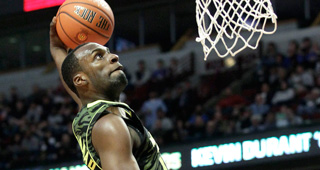Shabazz Muhammad was ruled ineligible by the NCAA on Friday for an alleged violation of amateurism rules.
Trips Muhammad made to Duke and North Carolina were paid by a financial adviser who is a family friend are the source of the NCAA's ruling.
Muhammad's family released the following statement on Tuesday.
"Shabazz and his family have been cooperating with the NCAA for well over a year. Earlier this year, the NCAA asked Shabazz and his family not to reveal to each other or to the press facts related to the NCAA investigation. Despite the many untrue rumors which were circulating on the Internet, Shabazz and his family dutifully did what they were told. In order to entice Shabazz's family and others to cooperate, the NCAA repeatedly gave assurances that it would keep details of the investigation strictly confidential. As recently as November 2012, the NCAA promised that it would not issue a press release.
"Last Friday, the NCAA released a press release which not only was wrong in its conclusions but which also inaccurately portrayed the investigation process in this case. For over a year, the NCAA has known all of the relevant facts related to its ruling last Friday. In 2010, Mr. Holmes [Shabazz's father] openly and honestly revealed to the NCAA the source of the payments on the NCAA's compliance form. Shabazz's family is now faced with the situation where they are concerned that any attempt to tell more of their side of the story will result in further punitive action, as Shabazz is still under the mercy of the NCAA. Shabazz and his family will continue to honestly cooperate with the NCAA in the hopes that Shabazz soon will be allowed to play basketball at UCLA."
The NCAA responded with a statement of its own, which said in part:
"… the NCAA staff has remained true to their statements to the Muhammad family, and we are committed to resolving the remaining matters as quickly as possible.
"… the NCAA staff requested specific documents on July 31 to assist in the evaluation of Muhammad's eligibility. However, the NCAA enforcement staff did not receive the majority of the requested documents for review until September 25, followed by more information on October 10, and the staff was granted access to additional critical information on November 1. On November 9, it was determined violations occurred, which was based on facts that were agreed upon by the university.
"It is important to note that NCAA amateurism rules are in place so that when student-athletes step onto the court, they are competing against other student-athletes who have met the same standards."


